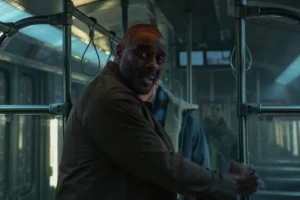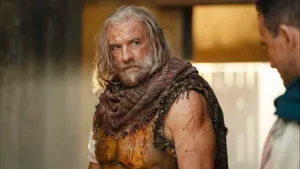Summary
HBO Max’s adaptation of DMZ has lots of ideas and performances to like, but it’s not long enough to make the most of them, and too short to have the visceral impact of a feature or a pilot.
This review of DMZ on HBO Max is spoiler-free.
Every now and again, you come across a show you really want to like, but that keeps holding itself back in frustratingly avoidable ways. DMZ, HBO Max’s four-part adaptation of the popular Vertigo comic series, is just that kind of show. It’s built on an interesting premise, stocked with interesting actors, and has worthwhile things to say. Often, it delivers action and character beats that work better than they have any right to. And yet the underlying niggles of an awkward miniseries format, both too short to really dig into and flesh out its ideas and too long to have the immediacy of a feature film or pilot, conspire to undermine every good decision and effective moment.
Adapted by Robert Patino, DMZ is set primarily within the demilitarized zone of Manhattan, a hotly contested and isolated fledgling nation caught awkwardly between the United States of America and the secessionist Free States of America after the Second American Civil War. This overarching context is gleaned mostly in snippets of expositional dialogue since it’s a low priority for a screenplay – all four episodes are credited to Patino – that wants to hone in on the central relationship between medic Alma (Rosario Dawson) and her son Christian, who were separated during the evacuation of New York City eight years prior.
We’re to understand that Alma has scoured both new nations in search of Christian, and has decided that now, for whatever reason, is time to venture into the DMZ to look there. We never really get a sense of what her search has entailed, how she was able to pass freely between both sides, or why she didn’t check the DMZ before. It’s just one of the things that we’re supposed to blithely accept, along with the highly convenient detail that Alma is personally acquainted with both of the DMZ’s potential leaders, who’re due to battle through an ostensibly democratic election for governorship right as she arrives.
In the blue corner is Wilson (Hoon Lee), who runs a private army out of Chinatown and sits on a small fortune of gold bullion. His campaign pitch is essentially letting everyone run amok, embracing the DMZ’s lawlessness and freedom from traditional bureaucracy. In the red corner is Parco (Benjamin Bratt), the charismatic leader of the Spanish Harlem Kings gang who wants to consolidate power on his own doorstep with the help of his feared bogeyman enforcer, Skel (Freddy Miyares). There are also other factions whose loyalty can be bought or earned, and together they make up an interesting tapestry of disenfranchisement that you’ll wish the show had more room to explore.
But there’s no time for that. DMZ’s favorite gimmick is a ticking-clock device – a countdown of how long Alma has to get out of the DMZ in the first episode, a countdown to the election after that – that feels ill-fitting in a show with hour-long episodes that often doesn’t feel in a hurry to get anywhere. A lot of the drama is the TV equivalent of video game side quests that seem to magically pause the main plot. It’s necessary for Alma to meet largely unimportant secondary characters to give the setting some texture, but it makes what she’s doing seem oddly detached from the tense reality that the show is trying to establish. And she also never seems to meet anyone who isn’t a) an important main character or b) somewhat thematically relevant who is otherwise completely unconnected to the election plot. It adds to that underlying feeling of contrivance. There’s easily an eight-episode series here in which Alma gets to know various faction leaders, their own plights and little communities, and becomes more personally invested in the leadership of the DMZ beyond her own personal family interests.
None of this happens, though, and nothing is made of the obvious point that almost everyone left in Manhattan isn’t white – a consequence of these disenfranchised people already being disenfranchised before the war, and thus unable or unwilling to secure safe passage during it. Since there’s no real time to devote to this stuff, a lot of the visuals try to do some heavy lifting. Ava DuVernay directs the first episode, and Ernest Dickerson the next three, and I enjoyed the visual compositions a lot, especially the use of color and the framing of those obligatory post-apocalyptic outdoorsy shots of recognizable urban areas in ruin.
And praise should be given to the performances. Dawson makes for an intense anchor, though she’s rarely asked to play anything beyond extreme upset or stoic resolve. Lee and Bratt – especially the latter – are both playing arch gang-boss types but commit gamely, summonsing a lot of comic book-y flamboyance that is pretty welcome. But the surprise standout for me was Freddy Miyares’s Skel, an impressively handsome and quietly terrifying graffiti artist and triggerman who capably runs the gamut of emotions from childlike vulnerability to cold killer and warm lover. He has a voice and a look that screams bigger things to me, and if DMZ accomplishes nothing else, it might be a springboard for this guy into bigger, more prominent roles.
Chances are, though, given its one-and-done miniseries format and lack of memorable qualities, DMZ doesn’t amount to much beyond an interesting streaming curio that’ll have you wondering how much more it might have been.




